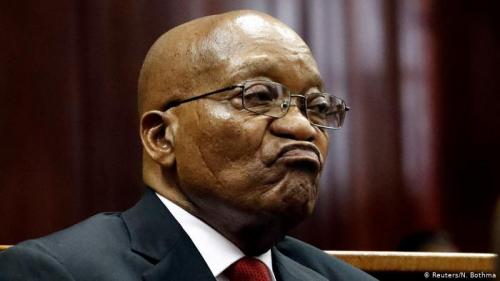INTERNATIONAL 01/02/2022
South Africa’s Zuma In Fresh Bid To Drop Graft Trial Prosecutor

South African ex-president Jacob Zuma was back in court on Monday in a fresh bid to replace the chief prosecutor in his long-running corruption trial over a 1990s arms deal.
High Court judge Piet Koen last year rejected Zuma’s application to have prosecutor Billy Downer dropped from the case.
Zuma had argued that the state attorney was neither independent nor impartial.
Returning to court, Zuma sought permission to appeal the earlier ruling — a request that could delay resumption of the trial if granted.
The case is scheduled to resume on April 11.
Defence lawyer Dali Mpofu said Monday that Zuma was of the “strong view” his case was being “treated differently” from others.
“If we speak of law, let’s speak of the law, let’s not have the Zuma law, let’s not have laws that are uniquely reserved for him,” said Mpofu in a hearing broadcast live on television.
Zuma, who was in court in the southeastern city of Pietermaritzburg on Monday, faces 16 counts of fraud, graft and racketeering related to the purchase of fighter jets, patrol boats and equipment from five European arms firms.
The accusation arise from a contract that was sealed in 1999, when he was vice president.
Zuma is accused of taking bribes from one of the firms, French defence giant Thales, which has also been charged with corruption and money laundering.
Both have denied any wrongdoing.
The trial started in May after repeated postponements as Zuma’s legal team battled to have the charges dropped.
Mpofu accused the prosecution of “unnecessarily” delaying the trial.
“Zuma must never be accused of delaying justice when he is only asserting (his rights),” said Mpofu.
Judgement on his request for a new prosecutor will be handed down on February 16.
Zuma, who turns 80 on April 12, was president from 2009 to 2018.
He was forced to step down by the ruling African National Congress (ANC) as graft scandals surrounding his government brewed into a political storm.
Last year he was given a 15-month jail sentence for contempt of court after refusing to give testimony to a panel probing “state capture” — financial sleaze and cronyism that proliferated under his presidency.
He was released on health grounds two months into the term.



